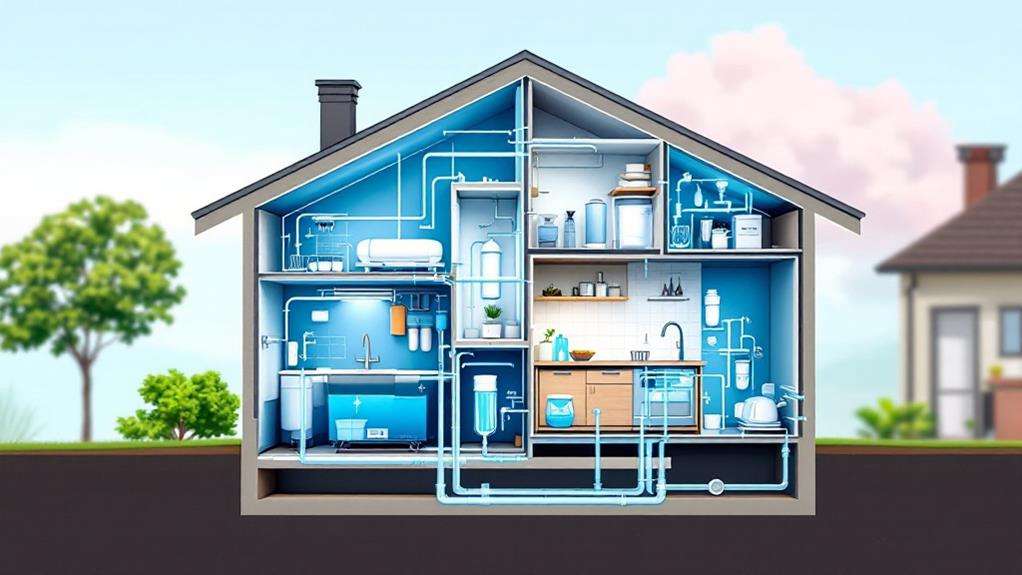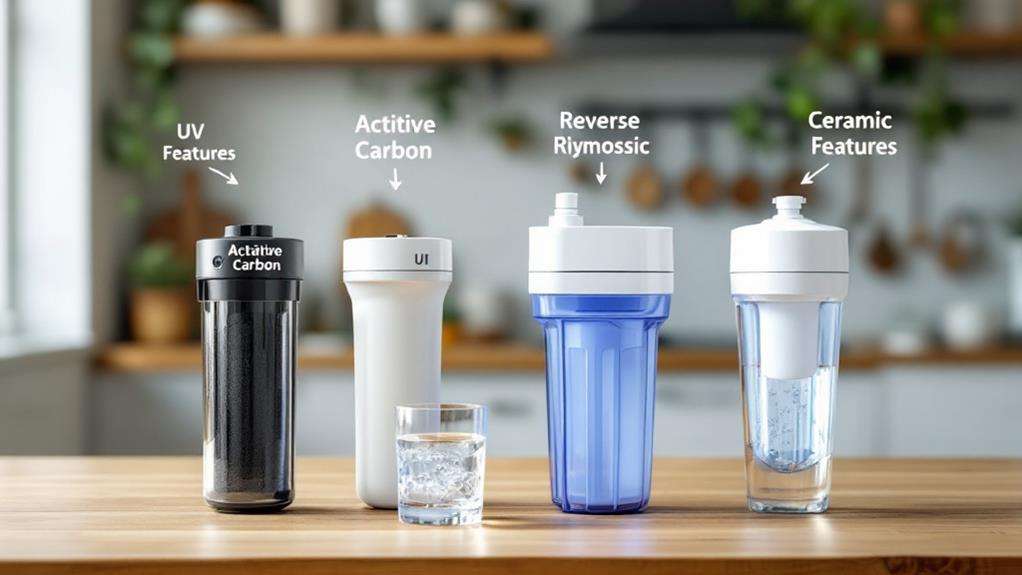Understanding the Basics of Water Filtration: Everything You Need to Know
Water filtration removes impurities and contaminants from your drinking water, ensuring it's safe and healthy. You'll find various types of filters, including whole-home systems, reverse osmosis, and carbon filters, each targeting specific contaminants like lead, bacteria, and chlorine. Filtered water not only tastes better but also protects you from harmful chemicals and extends the life of your appliances. When choosing a filter, consider your water quality concerns, budget, and installation requirements. Regular maintenance and filter replacement are essential for ideal performance. By understanding these basics, you'll be well-equipped to make informed decisions about your water filtration needs.
What Is Water Filtration?
In light of growing concerns about water quality, water filtration has become an essential process for many households. Water filtration is the process of removing impurities and contaminants from water to produce clean drinking water. It's a pivotal step in ensuring that the water you consume is safe and healthy.
When you use water filters, you're actively improving your tap water's quality by eliminating various unwanted substances. These can include sediment, chlorine, bacteria, and other pollutants that may affect the taste, odor, and safety of your drinking water. Water filtration systems work by passing water through different media, such as activated carbon, reverse osmosis membranes, or ceramic filters, to purify water and remove harmful particles.
Common Water Contaminants
Several common water contaminants can compromise the safety and quality of your drinking water. It is essential to be aware of these potential threats to guarantee you're consuming clean, safe water. Crucially, here are some of the most prevalent contaminants you should know about:
- Lead: This toxic metal can leach into your water from aging pipes and plumbing fixtures, posing significant health risks, especially for children.
- Microorganisms: Bacteria, viruses, and parasites can lurk in your water supply, causing various waterborne illnesses.
- Volatile organic compounds (VOCs): These chemicals, including industrial solvents and pesticides, may seep into water sources from nearby industrial or agricultural activities.
- Hard water minerals: Calcium and magnesium can build up in your plumbing and appliances, causing scale and reducing efficiency.
Additionally, nitrates and nitrites, often from agricultural runoff, can contaminate well water and pose dangers to infants. It is important to recognize that while some contaminants affect water quality, others can have serious health implications. Consistent water testing and appropriate filtration methods can help guarantee you're protected from these common water pollutants.
Types of Water Filter Systems

Now that you're aware of common water contaminants, let's investigate the various types of water filter systems available to combat these issues. Whole home water filter systems, also known as whole house water filtration, offer comprehensive protection by treating water at the point of entry. These systems often include a combination of sediment filters, carbon filters, and water softeners to address multiple contaminants.
For specific concerns like heavy metals or PFAS chemicals, reverse osmosis systems are highly effective. They can significantly reduce total dissolved solids and improve water quality. Carbon filters are excellent for removing unpleasant tastes and odors, while sediment filters tackle larger particles.
Water softeners are pivotal for managing hard water issues, removing minerals like calcium and magnesium. When choosing a system, consider the flow rate to ensure it fulfills your household's needs.
For those who enjoy camping or need emergency preparedness, gravity-fed systems are ideal when electricity isn't available. These portable options provide clean, safe drinking water on the go.
Regardless of the system you choose, water filter systems are generally easy to maintain and offer a cost-effective, environmentally friendly alternative to bottled water.
Benefits of Filtered Water
Five key benefits make filtered water an essential choice for your household. By using home water filtration systems, you'll enjoy safer, better-tasting water while protecting your health and the environment. Filtered water removes contaminants like lead, chlorine, and bacteria, reducing your exposure to harmful chemicals such as perfluorinated compounds (PFCs) that may be present in your water supply.
The advantages of filtered water extend beyond health benefits:
- Improved taste and odor due to the removal of chlorine and other impurities
- Extended lifespan of household appliances by preventing mineral buildup and corrosion
- Reduced environmental impact compared to bottled water consumption
- Cost savings in the long run compared to purchasing bottled water regularly
Whether you opt for an activated carbon filter, reverse osmosis system, or a whole home water filter system, you'll address various water problems and improve your overall quality of life. By investing in filtered water, you're not only tackling potential health problems but also contributing to a more sustainable future. Don't let your water supply cause you unnecessary worry – make the switch to filtered water today and enjoy peace of mind knowing you're drinking clean, safe water often.
Choosing the Right Filter

Selecting the right water filter for your home can seem challenging at first glance. To make the best choice, you'll need to think about several factors, including your water source, contaminant types, budget, and installation requirements.
If you're looking for an affordable and convenient option, pitcher filters are a great start. They're effective at removing chlorine and some particulates from tap water. For a continuous flow of filtered water, faucet-mount filters are a good choice, though they can become heavy over time. If you're concerned about a wider range of contaminants like industrial chemicals and pesticides, countertop filters offer more extensive filtration than pitchers.
For the most thorough water purification, reverse osmosis systems are your best bet. These systems can remove up to 99% of dissolved solids and contaminants but require professional installation. Keep in mind that the effectiveness of each filter type varies, so it's important to match your specific needs with the right filtration method. By thinking about your water quality, budget, and installation preferences, you'll be able to choose a filter that provides clean, safe water for your household.
Maintenance and Replacement Guidelines
Once you've chosen the right water filter for your needs, it's important to keep it functioning ideally. Proper maintenance and timely replacement of filters are fundamental for ensuring clean, safe water. Water filter systems require regular attention to maintain their effectiveness and extend their lifespan.
Different types of filters have varying maintenance schedules and replacement intervals. Here are some general guidelines to follow:
- Check your filter's manufacturer instructions for specific maintenance requirements and replacement timelines.
- Replace carbon filters every 3-6 months, or sooner if you notice a change in water taste or odor.
- Clean or replace sediment filters every 1-3 months, depending on your water quality and usage.
- For whole house water systems, schedule professional installation and annual maintenance checks.
As water flows through your filter, contaminants accumulate, reducing its efficiency over time. Regular maintenance helps prevent clogging and ensures ideal performance. Pay attention to changes in water pressure, flow rate, or quality, as these may indicate it's time for filter replacement or water treatment system servicing. By following these guidelines, you'll keep your water filter system operating at peak efficiency, providing clean, fresh water for your household.
